Key takeaways:
- Plastic waste poses significant threats to the environment, marine life, and human health, with a large proportion going unrecycled.
- Adopting small daily habits, such as using reusable bottles and meal prepping, can greatly reduce personal plastic consumption.
- Choosing eco-friendly alternatives, like beeswax wraps and natural fibers, fosters sustainable living and encourages discussions around environmental impact.
- Proper waste management, including recycling and composting, is essential; education on local recycling guidelines enhances effective waste disposal.
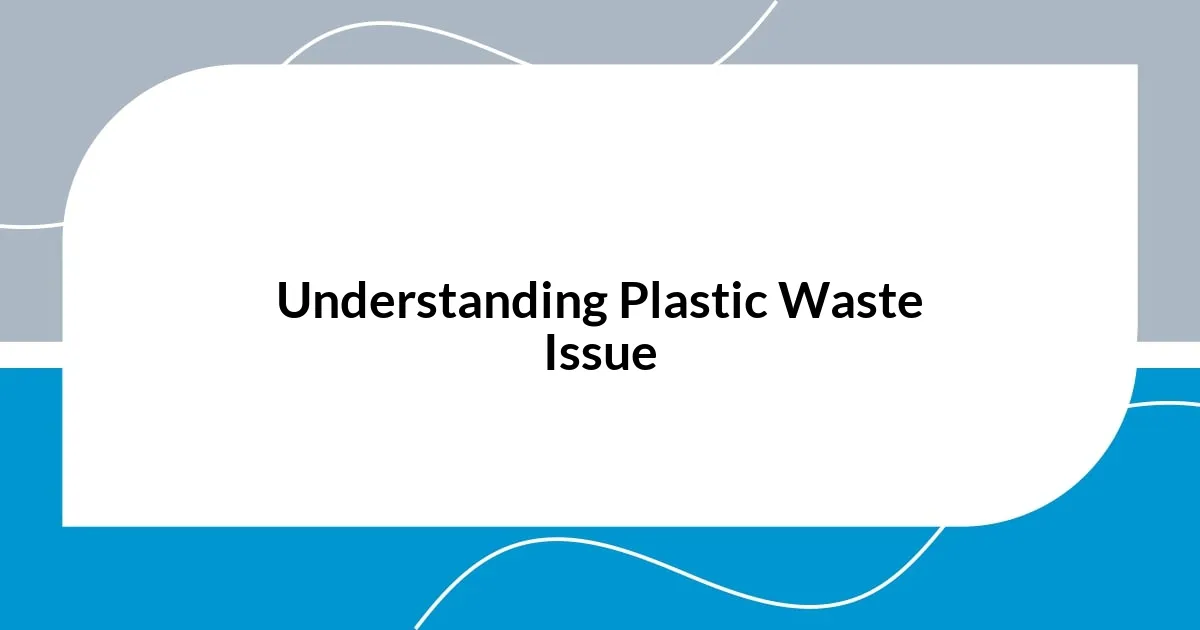
Understanding Plastic Waste Issue
Plastic waste is a growing crisis that affects not just our oceans and wildlife but also our health and well-being. I still remember a beach trip where I stumbled upon a patch of sand littered with plastic bottles and wrappers. That sight struck me deeply; it really made me question what kind of planet we’re leaving for future generations.
Every year, millions of tons of plastic end up in landfills and oceans, disrupting ecosystems and harming marine life. Think about it—how many single-use plastic items do we use daily without a second thought? Each time I find myself reaching for a plastic bag or a straw, I’m reminded of their lasting impact. It can be overwhelming to realize that many of these items will outlive us.
What’s perhaps even more troubling is that only a fraction of plastic is recycled effectively. In my experience, it’s clear that simply recycling isn’t enough. I often challenge myself to choose alternatives—like bringing my own bags to the grocery store—and it’s made a world of difference in how I perceive waste. When we truly understand the plastic waste issue, it becomes easier to take action in our daily lives.
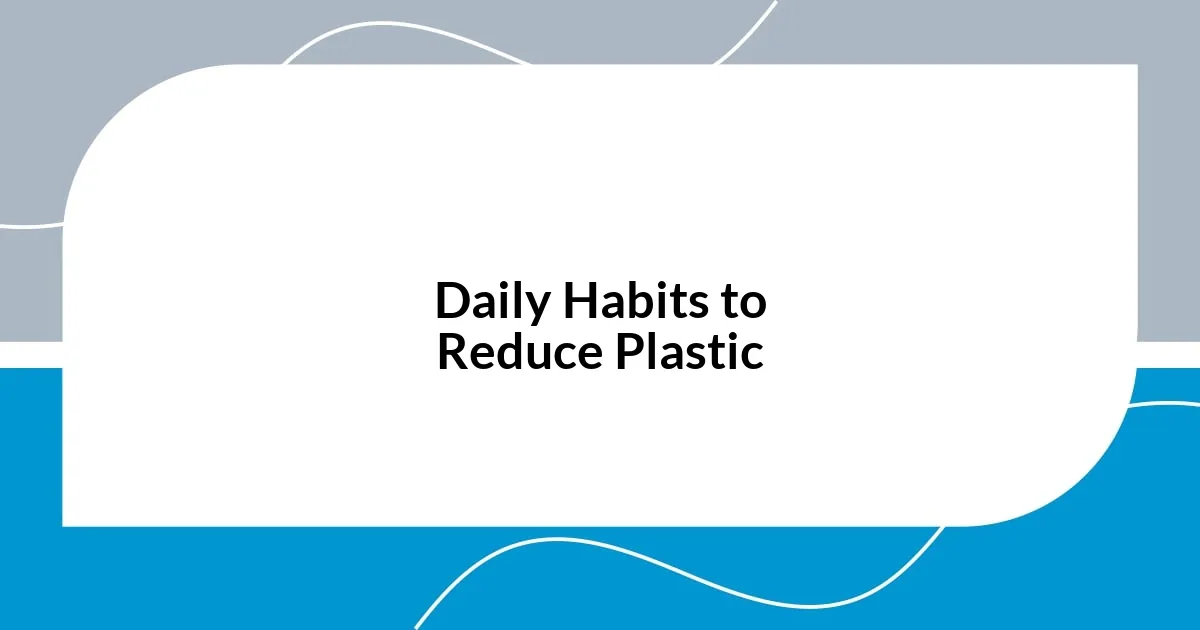
Daily Habits to Reduce Plastic
I’ve found that small changes in daily habits can significantly reduce plastic use. For instance, I started carrying a reusable water bottle everywhere. It’s amazing how quickly I stopped buying bottled water. Seeing my own bottle as a constant reminder made me feel empowered to combat plastic waste.
Another habit that’s transformed my routine is meal prepping. Instead of buying pre-packaged salads or snacks, I now plan my meals and store them in reusable containers. Not only does this save money, but it also means fewer plastic wraps and containers entering the recycling bin. Plus, I genuinely enjoy the process of cooking and preparing healthy meals at home.
It’s also rewarding to be mindful about my shopping habits. Whenever I go grocery shopping, I make a point of choosing items with minimal or no plastic packaging. The first time I navigated the store, filling my cart with loose produce rather than plastic-wrapped options felt liberating. This practice not only reduces overall plastic waste but also encourages me to try new, fresh foods that I might not have considered before.
| Habit | Benefit |
|---|---|
| Using a reusable water bottle | Reduces bottled water purchases |
| Meal prepping in reusable containers | Minimizes plastic wrap and packaging |
| Choosing loose produce | Encourages healthier eating and less plastic waste |
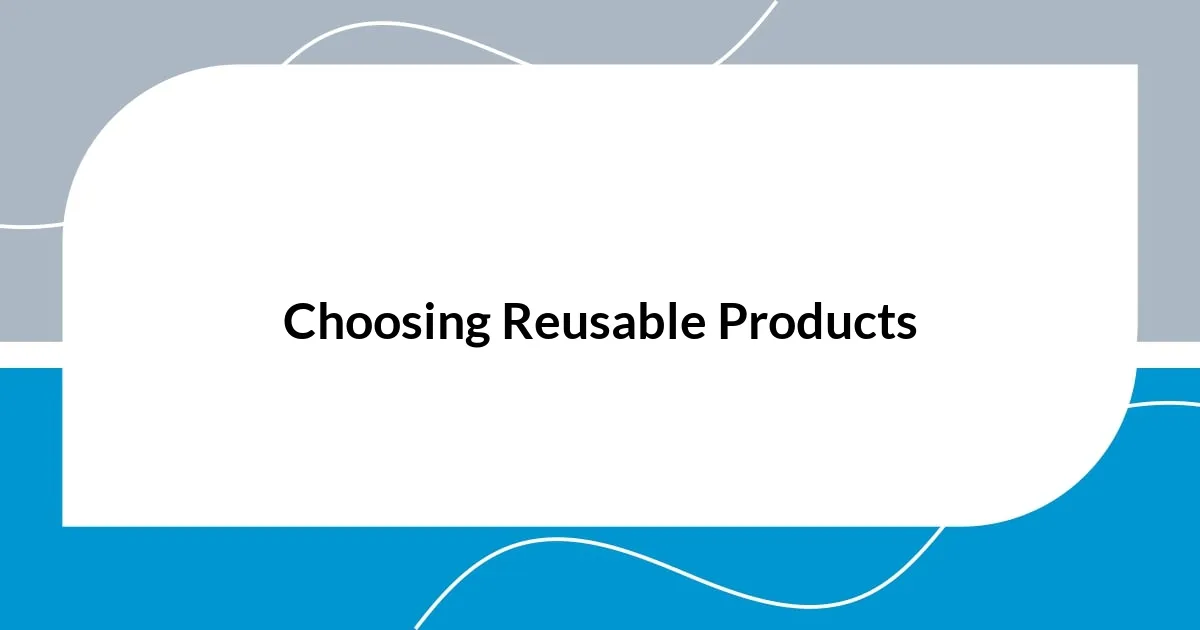
Choosing Reusable Products
When it comes to choosing reusable products, I’ve realized the importance of investing in items that reduce my reliance on single-use plastics. For instance, I recently purchased a set of stainless steel straws, and I can’t begin to tell you how satisfying it feels to pull one out in a café. It not only prompts curious looks from friends who often ask about them, but it also sparks conversations about our collective impact on the environment. Finding joy in these small choices has become an empowering journey for me.
Here are some reusable products that I recommend incorporating into daily life:
- Cloth shopping bags: Ideal for groceries and reduce reliance on plastic bags.
- Stainless steel or glass straws: Durable alternatives that can be easily transported.
- Bamboo utensils: Great for on-the-go meals without jumping on the disposable cutlery train.
- Reusable coffee cups: Perfect for those daily caffeine fixes and often come with a discount at coffee shops.
Every little change feels like a step forward, and I genuinely enjoy sharing my journey with others who might be on the fence about making similar swaps. It’s a reminder that the choices we make can ripple through our communities, sparking changes that extend beyond our individual habits. I often think about how my kids will grow up in a world with less plastic clutter, and it fills me with hope.
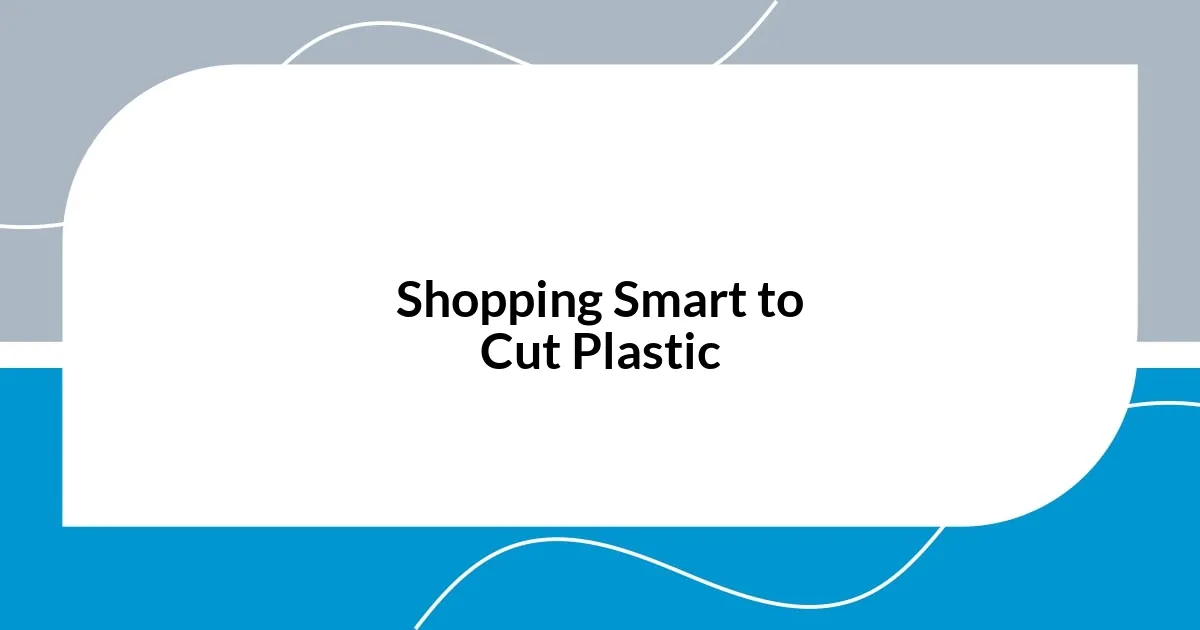
Shopping Smart to Cut Plastic
I always find that making a shopping list helps me stay focused. I used to wander the aisles, often picking up items wrapped in plastic without a second thought. Now, with a clear list in hand, I can prioritize buying from bulk bins and local farmers’ markets instead. On one memorable trip, I discovered a local grower who sold beautiful, unwrapped fruits and vegetables. The thrill of picking fresh produce directly from the source was almost indescribable.
Another tip I’ve embraced is shopping second-hand whenever possible. Thrift stores and consignment shops are gold mines for clothing and household items that don’t come packaged in plastic. One day, while browsing, I found a gorgeous vintage jacket that instantly became my favorite go-to. Not only did I save money, but knowing I kept an item from being wasted felt truly gratifying.
I also pay attention to brands that prioritize sustainability. It’s encouraging to align my purchases with companies that share my values. Recently, I shifted to a brand of laundry detergent that uses paper packaging rather than plastic containers. It was such a simple swap, but it lifted my spirits knowing I was supporting a more eco-conscious choice. What simple changes have you made that make you feel great about your choices?
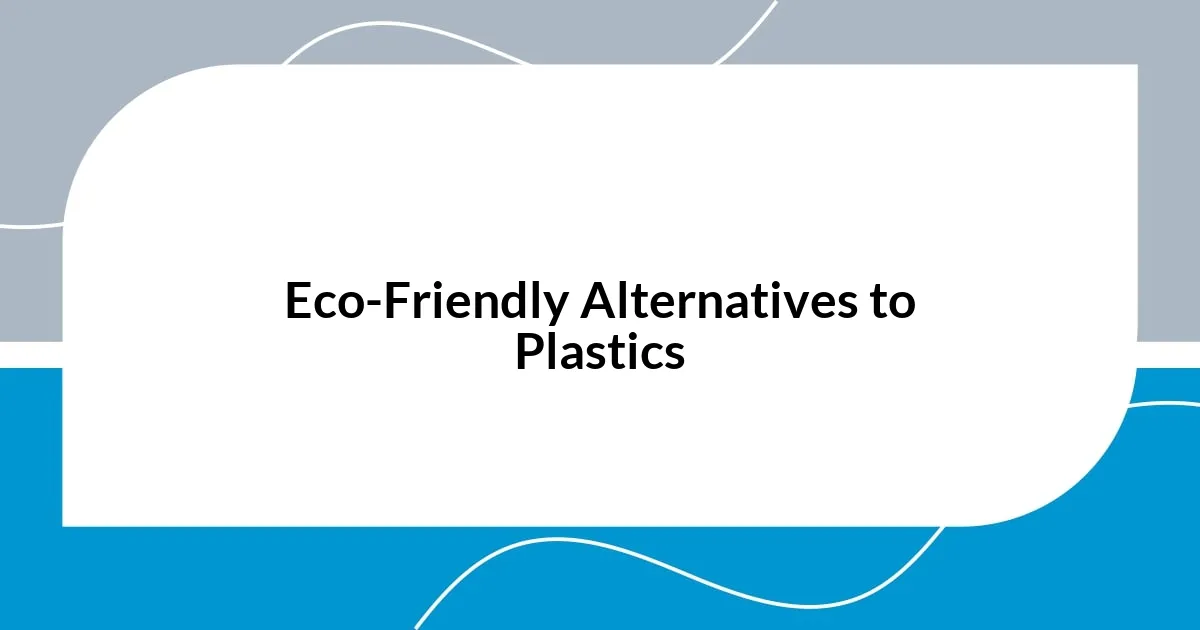
Eco-Friendly Alternatives to Plastics
It’s truly fascinating how many eco-friendly alternatives to plastics are available now. One of my favorites is using beeswax wraps instead of plastic wrap. The first time I used them, I felt this surprising wave of satisfaction as I wrapped up leftovers. They not only keep food fresh but also add a lovely, natural aesthetic to my kitchen. It makes me think—how much waste could we collectively reduce if we all made this simple swap?
I’ve also embraced the beauty of natural fibers in my household. Switching to cotton dish towels and napkins was another eye-opener for me. The tactile experience of using soft, reusable towels instead of paper ones has made cleaning up a more pleasant task. I remember the first family dinner where I laid out my vibrant cotton napkins; it sparked a conversation about sustainability that my children surprisingly engaged in. It’s moments like these that remind me how essential it is to set an example for the next generation.
And let’s not forget about water bottles. Investing in a sturdy, insulated bottle has been a game-changer in my life. I still recall embarking on a hike with my new bottle, filled with fresh water. It was refreshing not just physically but emotionally, knowing I wasn’t contributing to plastic pollution. It got me thinking—how often do we overlook the power of our daily choices? Sometimes, these small adjustments lead to profound changes in how we interact with the world around us.
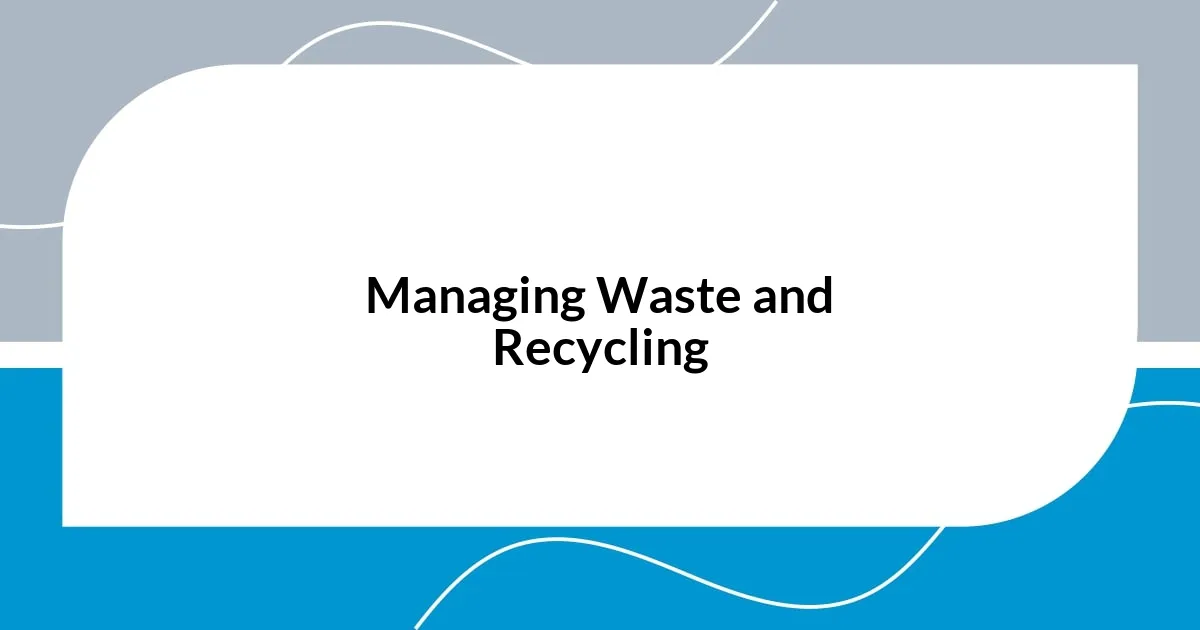
Managing Waste and Recycling
Managing waste and recycling plays a crucial role in reducing plastic use, and I’ve learned to approach it with intention. Every time I empty my recycling bin, I take a moment to sort the items mindfully, reminding myself that each gesture counts. It became a personal ritual for me, particularly after realizing how much of my previous recycling ended up in the landfill due to contamination. I now see it as an act of care, not just for my home, but for our planet as well.
I’ve also started composting kitchen scraps, which has significantly reduced the waste I send to the landfill. At first, I was hesitant, wondering if I would truly be able to manage it. But as I watched the compost pile break down over time, creating nutrient-rich soil, I felt a sense of accomplishment. The joy of transforming what would have been waste into something valuable for my garden is incredibly rewarding. Have you ever considered composting? The positive impact on the environment and your garden can be a delightful surprise.
Lastly, I make it a point to educate myself about local recycling guidelines. It’s astonishing how many people don’t realize that recyclables vary by location. After one conversation with a local recycling coordinator, my perspective shifted completely. I started double-checking labels and doing a quick research session online before tossing items into the blue bin. Now, I feel empowered knowing that I’m doing my part correctly, which reinforces my commitment to sustainable living. What about you—how do you navigate the world of recycling? Every bit of knowledge helps us all contribute to a healthier environment.